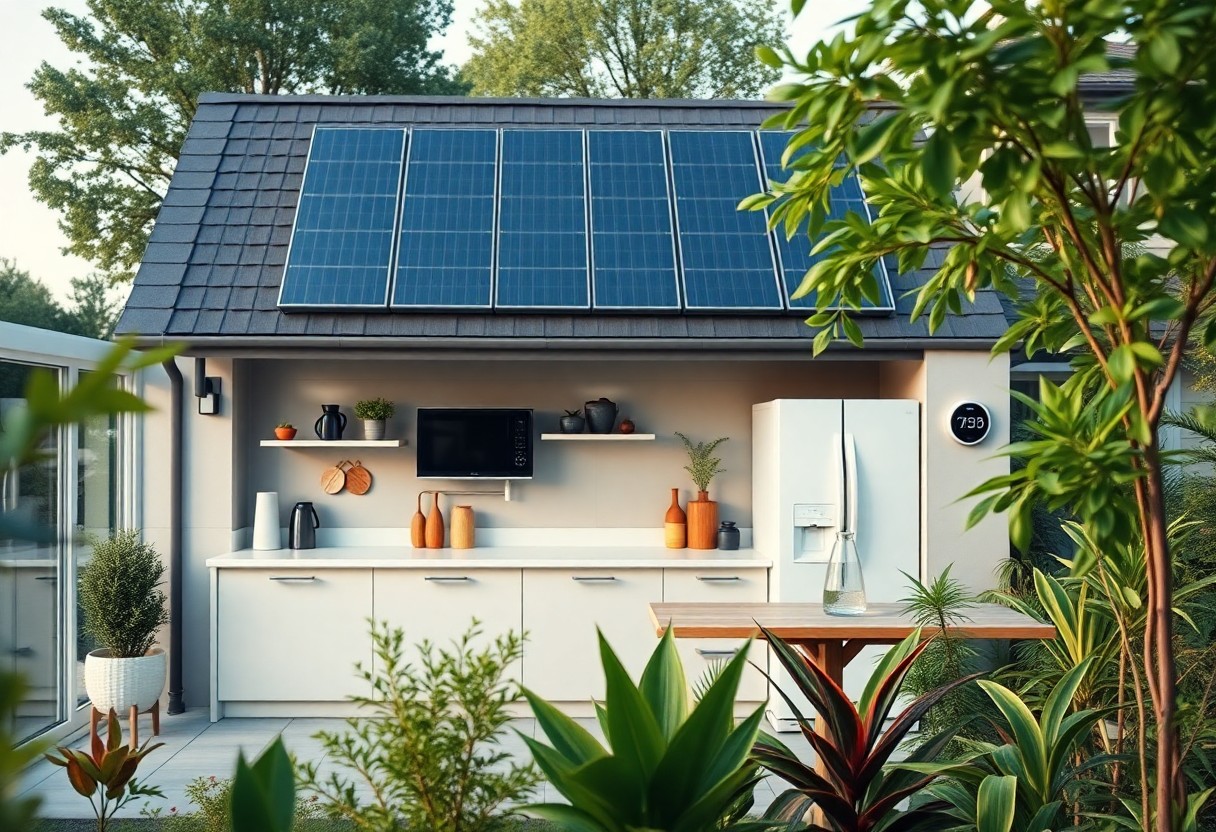Smart Technology And Sustainability – Reducing Your Carbon Footprint
Delicious Recipes With Built-In Portion Control Ideas
April 15, 2025Why Portion Control Is Key To Sustainable Weight Loss
April 16, 2025Most individuals are increasingly aware of their role in protecting the environment, and leveraging smart technology can significantly help you reduce your carbon footprint. By integrating devices like smart thermostats, energy-efficient appliances, and automated lighting systems, you can lower energy consumption while enhancing your daily life. This post will guide you through innovative solutions and practical tips that empower you to make eco-friendly choices, demonstrating how your actions can have a lasting impact on the planet’s health. Embrace smart technology today for a sustainable tomorrow!
Understanding Carbon Footprints
Your carbon footprint is a measure of the total greenhouse gases emitted directly or indirectly by your activities, expressed as carbon dioxide equivalents. It encompasses everything from the energy you consume in your home to the food you eat and the products you buy. By understanding your carbon footprint, you can identify areas for improvement and make informed choices to reduce your environmental impact.
Definition and Importance
Against the backdrop of escalating climate change, understanding your carbon footprint has become important. It not only reflects your contribution to global warming but also serves as a benchmark that can guide your efforts towards more sustainable living. Being aware of your footprint empowers you to make conscious decisions that minimize your ecological impact.
Measurement Methods
Understanding how to measure your carbon footprint is important for tracking your progress effectively. Carbon footprints can be assessed using various methods, including personal carbon calculators, emissions tracking apps, and by evaluating energy consumption monthly. Each method provides insights into your emissions, helping you pinpoint where reductions can occur and allowing you to set realistic goals for sustainability.
Further, leveraging technology can enhance the accuracy of your measurement methods. For instance, using carbon footprint calculators not only simplifies the process but can also offer personalized recommendations for reducing emissions based on your specific habits and consumption patterns. When you employ smart technology, such as energy monitoring devices or automated systems in your home, you can track real-time energy usage, making it easier to identify high-impact areas. These tools collectively empower you to take action and adapt your lifestyle in ways that significantly contribute to a sustainable future.

The Role of Smart Technology in Sustainability
Some of the most impactful innovations today lie in smart technology, which plays a vital role in promoting sustainability. These advanced systems not only enhance convenience and efficiency but also significantly contribute to reducing your carbon footprint. By integrating smart devices into your daily life, you can effectively monitor and optimize resource consumption, paving the way for a greener future.
Energy Efficiency
By utilizing smart technology, you can maximize energy efficiency in your home or business. Smart thermostats, for example, automatically adjust heating and cooling based on your preferences and usage patterns. This not only saves energy but also lowers your utility bills, allowing you to contribute positively to the environment.
Resource Management
Around the globe, smart technology is transforming how you manage resources. With smart water systems, for instance, you can monitor usage and detect leaks in real-time, ensuring conservation efforts are effective. This proactive approach further empowers you to take meaningful steps toward sustainability.
Technology facilitates improved resource management by enabling you to monitor and analyze patterns in consumption. Smart sensors can track water usage, alerting you to potential leaks and inefficiencies, which saves both money and vital resources. Similarly, smart irrigation systems can optimize your landscape’s water needs, reducing wastage and enhancing plant health. Leveraging these tools not only makes you more aware of your consumption habits but also allows you to make informed decisions that positively impact the environment.
Smart Home Innovations
One of the most effective ways to enhance your home’s energy efficiency is through smart home innovations. These technologies not only streamline your daily routines but also significantly contribute to reducing your carbon footprint. By integrating various smart devices, you can monitor and optimize your energy consumption, positioning your home as a model of sustainability.
Smart Thermostats
Among the most popular smart home innovations are smart thermostats, which allow you to control your heating and cooling systems remotely. These devices learn your schedule and preferences, adjusting temperatures automatically to maximize comfort while minimizing energy usage.
Energy Monitoring Systems
By implementing energy monitoring systems, you gain insights into your energy consumption patterns. These systems help you identify high usage areas and adjust habits accordingly, promoting sustainability in your daily life.
But it’s not just about monitoring; with energy monitoring systems, you can identify peak usage times and make informed decisions about your energy source. For instance, by utilizing this data, you can shift your energy-heavy tasks to off-peak hours, ultimately saving money and reducing your overall carbon footprint. These systems empower you to not only track your consumption but also take actionable steps to lower your energy bills and contribute positively to a sustainable future.
Sustainable Transportation Solutions
To achieve a significant reduction in your carbon footprint, it is imperative to explore Reducing Carbon Footprints Through Smart Technology … in transportation. Sustainable transportation solutions such as electric vehicles and smart public transport systems play a vital role in minimizing emissions while enhancing efficiency. By adopting these technologies, you can make a more conscious choice that benefits both the environment and your daily commute.
Electric Vehicles
An electric vehicle (EV) is an excellent option for eco-conscious individuals. EVs produce zero tailpipe emissions, making them a cleaner alternative to traditional gasoline-powered cars. By choosing an EV, you contribute to a significant decrease in greenhouse gas emissions while also enjoying cost savings on fuel and maintenance.
Smart Public Transport Systems
Across urban landscapes, smart public transport systems are revolutionizing the way you travel. These systems leverage technology to enhance efficiency, reduce wait times, and lower emissions. With real-time tracking and optimized routes, you can enjoy a more connected and convenient travel experience, ultimately leading to a smaller carbon footprint.
Hence, smart public transport systems not only facilitate efficiency but also encourage a shift away from personal vehicles, which are often significant sources of emissions. By incorporating digital ticketing, real-time updates, and eco-friendly modes of transport, these systems promote widespread use and accessibility. Embracing such solutions in your daily commute can lead to a notable decrease in your carbon footprint and contribute to the creation of greener urban environments.
The Impact of Smart Cities
Once again, the emergence of smart cities represents a turning point in urban development, aiming to enhance the quality of life while reducing your carbon footprint. By integrating innovative technologies into city structures, these urban landscapes optimize resources, promote sustainability, and foster community engagement. The result is a more efficient use of energy, water, and other vital services, ultimately leading to a significant reduction in greenhouse gas emissions.
Urban Planning and Infrastructure
To effectively create smart cities, urban planning and infrastructure must be designed with sustainability in mind. This involves implementing green building techniques, enhancing public transport systems, and promoting mixed-use developments that minimize the need for long commutes. By prioritizing these smart design elements, you contribute to a healthier environment and a more connected community.
Waste Management and Recycling
Infrastructure plays a pivotal role in waste management and recycling systems within smart cities. By leveraging advanced technologies, such as IoT devices and AI analytics, cities can monitor waste levels and optimize collection routes, reducing fuel consumption and emissions. Additionally, implementing smart recycling bins and rewards programs encourages participation, leading to higher recycling rates and less waste sent to landfills.
Also, effective waste management in smart cities not only promotes sustainability but also mitigates the harmful effects of waste disposal on the environment. Utilizing data-driven approaches allows you to identify waste generation patterns and implement targeted strategies to minimize waste production. This can lead to discovering new recycling opportunities and developing innovative solutions to transform waste into useful resources, further enhancing your community’s resilience and ecological responsibility.
Consumer Behavior and Smart Technology
Now, the rise of smart technology is reshaping how you make daily choices, influencing your consumption patterns and habits. With devices that can track energy usage, suggest eco-friendly products, and minimize resource waste, you can make informed decisions that align with sustainability goals. This behavioral shift encourages you to embrace smarter lifestyles, seamlessly integrating technology to reduce your carbon footprint.
Encouraging Sustainable Choices
After integrating smart technology into your life, you find it easier to make sustainable choices. Apps and devices provide insights into your consumption habits, suggesting greener alternatives and nudging you towards eco-friendly products. This personalized guidance motivates you to consider the environmental impact of your purchases, fostering a more mindful consumption experience.
Reducing Waste through Smart Solutions
Between the capabilities of smart technology and the increasing awareness of sustainability, you have greater tools than ever to minimize waste. By utilizing smart appliances, you can monitor and control usage in real-time, enabling you to avoid overconsumption and reduce your environmental impact.
But reducing waste effectively hinges on leveraging smart solutions that fit seamlessly into your daily life. By using smart home devices, like IoT-enabled fridges that track food expiration dates, you can significantly lower the likelihood of food waste. Additionally, apps that optimize your shopping lists and recommend portion sizes help you buy only what you need. Collectively, these innovations not only enhance your efficiency but also contribute to a more sustainable lifestyle in significant ways. Embracing these technologies means you play an active role in shaping a greener future.
Summing up
Taking this into account, embracing smart technology can significantly enhance your sustainability efforts and reduce your carbon footprint. By integrating energy-efficient devices, utilizing smart home systems, and opting for eco-friendly transportation solutions, you actively contribute to a healthier planet. Moreover, leveraging data analytics can help you make informed decisions, optimizing resource use in daily life. As you adopt smart technologies, you not only improve your lifestyle but also play a vital role in fostering an environmentally sustainable future for generations to come.
NEWSLETTER






